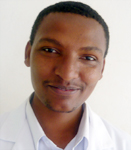
A Successful Initiative for Health Workforce Development in Ethiopia
 Mental health is not always on the forefront of people’s minds when they think about global health and the critical shortage of trained health workers. But the need is there.
Mental health is not always on the forefront of people’s minds when they think about global health and the critical shortage of trained health workers. But the need is there.
In Ethiopia, Dr. Markos Tesfaye recalls a “huge mental health professional deficit.” He is head of the department of psychiatry in the College of Public Health and Medical Sciences at Jimma University. In 2007, he says, “there were only 28 psychiatrists in the country for a population of about 80 million.” Complicating matters, he recalls, “psychiatry nurses who had advanced diploma-level education were shifting to do their degree in general nursing because of lack of opportunities to advance their career in the field of mental health.”
Sister Worknesh Tessema is a good example: she has a special love for providing care for people with mental illness and has worked in a psychiatric clinic for 15 years. She wanted to pursue further training in mental health, but there wasn’t a suitable degree program. After many years of waiting, she decided to advance her career by obtaining a BSc in general nursing.
T he referral hospital at Jimma University has a catchment area of over five million people, but its capacity to provide mental health care was slight. Dr. Tesfaye, a general practitioner, and three psychiatry nurses were the only trained staff available for psychiatric care. “I realized that my role as a psychiatrist caring for psychiatric patients every day would be inefficient,” he recalls.
he referral hospital at Jimma University has a catchment area of over five million people, but its capacity to provide mental health care was slight. Dr. Tesfaye, a general practitioner, and three psychiatry nurses were the only trained staff available for psychiatric care. “I realized that my role as a psychiatrist caring for psychiatric patients every day would be inefficient,” he recalls.
Instead, he thought it would more effective to set up a postgraduate program that would train specialists who could help with the clinical work and teach undergraduates. He shared his idea with colleagues in Ethiopia and abroad. “It was very helpful that Dr. Zerihun Tadesse at the Federal Ministry of Health and officials at Jimma University have welcomed the idea of developing a mental health specialist program for midlevel health workers,” he says. “The program was found to be appropriate because there were many potential candidates to be trained; the training is not very expensive as well, as the specialists are believed to remain in the country and work in their field of specialty.”
Dr. Tadesse helped organize a consultative meeting in 2008 involving various stakeholders. All committed to support Jimma University in realizing the MSc program in mental health, which welcomed its first students in January 2010. Dr. Tesfaye says the demand has been so high that “a similar program had to be opened at University of Gondar in cooperation with Amanuel Mental Specialized Hospital.”
As you might imagine, Sister Worknesh was excited by the launch of the MSc program in mental health, and she joined the first cohort. She plays an active role in teaching psychiatry undergraduate nursing students and engages in advocacy for mental health. The first group of students will graduate in January 2012.
CapacityPlus’s HRH Global Resource Center recently added a new section on mental health to reflect the growing body of literature and interest in the health workforce components of this issue.
Related items:
Photo 1 by Trevor Snapp. Photo 2 courtesy of Markos Tesfaye, MD.


